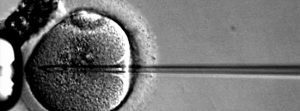 Intracytoplasmic sperm injection is more commonly known by its acronym, ICSI. During in vitro fertilization (IVF), the embryologist isolates healthy-looking sperm to inject into the cytoplasm or outer layer of the egg or oocyte. We perform this process with special micro-pipettes under microscopic control.
Intracytoplasmic sperm injection is more commonly known by its acronym, ICSI. During in vitro fertilization (IVF), the embryologist isolates healthy-looking sperm to inject into the cytoplasm or outer layer of the egg or oocyte. We perform this process with special micro-pipettes under microscopic control.
ICSI enhances fertilization in cases of very low sperm count, poor motility, or a high percentage of abnormal sperm. In addition, it also can increase success when the egg can be difficult to penetrate because of a thick outer layer. Doctors also use ICSI to improve the chances of IVF success after repeated failures.
Traditional IVF Versus IVF with Intracytoplasmic Sperm Injection/ ICSI
In a traditional IVF cycle, sperm and eggs are combined in the laboratory in a petri dish with the anticipation they will create embryos. In each sperm sample, there there are enough motile (swimming) sperm to affect fertilization.
However, when sperm can not penetrate the egg’s outer layer for several reasons, we use ICSI to facilitate fertilization.
Sometimes the sperm cannot penetrate the outer layer of the egg for a variety of reasons, including the egg having a too hard or thick outer layer or the sperm’s inability to swim. ICSI is needed to help fertilize the egg. During ICSI, a single sperm is injected directly into the egg’s cytoplasm.
Who needs Intracytoplasmic Sperm Injection/ICSI?
ICSI helps to overcome fertility problems, such as:
-
- The male partner has insufficient sperm and cannot undergo intrauterine insemination [IUI]) or IVF.
- The sperm has motility problems and does not swim in the right direction.
- The sperm may have trouble attaching to the egg.
- A blockage in the male reproductive tract may keep sperm from getting out.
- Eggs have fertilization issues even with sufficient sperm
- Using previously frozen eggs.
- The couple has unexplained infertility or repeat IVF failures.
- More information about Intracytoplasmic Sperm Injection/ICSI.

